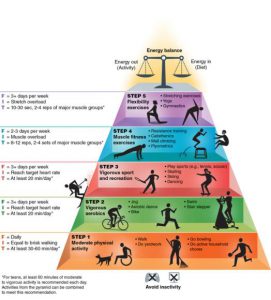Maintaining your Physical Health
 Physical activity
Physical activity
Most healthy children and adults should be active on a daily basis. This should be a mix of both leisurely physical activity and structured exercise.
Examples of leisurely physical activity include hiking, cycling, and walking. Examples of more structured forms of exercise include strength training, running, and sports.
Nutrition and diet
Eating a healthy balanced diet is an important part of maintaining good health and can help you feel your best. This means eating a wide variety of foods in the right proportions and having the right amount of food and drink to achieve and maintain a healthy body weight.
A well-balanced diet should contain carbohydrates, proteins, fats, vitamins, and minerals. Restricting specific nutrients should only be done under the supervision of a health professional. Fluid, ideally in the form of clean water, should be regularly consumed. Meals and snacks should be consumed throughout the day, and portion sizes should be sensible.
Alcohol and drugs
Substances that alter mood or other bodily processes should be limited or avoided. Those with addictive tendencies or other health risks should consider complete abstinence from these substances.
Medical self-care
Each individual or family will be allocated a family doctor, known as a General Practitioner (GP). The GP is the first point of contact for all ailments. An appointment can be made by telephoning the surgery.
Basic items, such as bandages, lozenges, and over-the-counter pain-relieving medications, should be easily accessible from home. Long-term coughing, fevers, or other ailments should be addressed through primary care. Emergency treatment should be sought when signs and symptoms are significant or life-threatening.
Rest and sleep
While regular activity is essential for physical health, allowing the body to rest is just as important. Spending time relaxing or taking short naps can help rejuvenate the body. Sleep should take place in a quiet, dark environment and should last approximately 7-9 hours. Consistent sleep that is much shorter or longer than this duration, or is low quality, may need to be addressed by a health professional.
